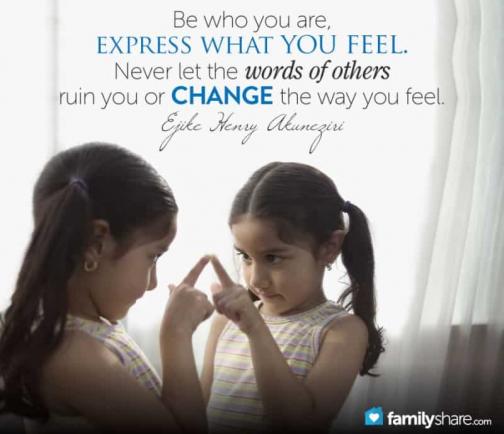
Babies are beautiful and perfect when they are born, even if their heads are a little cone-shaped. As they grow, children get mixed messages about body image. Parents and loved ones are usually full of praise and compliments. Once the outside world starts to influence them, children might think they have to look a certain way to be accepted and beautiful. Sometimes their own inner voice tells them they are ugly, fat, too skinny or otherwise imperfect.
As a parent, you have the important job of helping your children accept their physical appearance and like who they are. Ultimately it's up to each child to decide to love himself, but you can nurture healthy amounts of self-acceptance and self-confidence. The following five ideas will help you begin today.
Set a good example
Young children want to be just like their parents. My youngest daughter is by my side all day long, exercising, cleaning and running errands. She also wants to stand on a stool in the bathroom while I get ready for the day. It's a great time to teach her about taking care of her teeth, but I don't like that she asks for makeup when I put mine on.
Like me, you may need to be careful about the way you present yourself to your children. Sometimes I have a few pounds to lose, and I make disparaging comments about my weight. My children hear and notice. Studies show children as young as 6 years old are thinking about dieting. Children learn from your example, so think before you speak negatively about your body or anyone else's.
Speak positively
My son takes after his father, tall and thin. I think it's great when he declares, "I love to be so skinny!" Some might call him scrawny, but he's accepted his shape and enjoys using his body for hip-hop dancing and playing flag football. As kids reach middle school age, they tend to focus on outward appearance as their own bodies change. Stop negative comments about others and try to help children learn to give compliments. When kids make healthy choices and look well-groomed, point it out. Do the same for your spouse and yourself.
Let children guide
Some kids take great interest in personal care and grooming, and others don't want to spend extra time on their looks. Beyond basic cleanliness (regular bathing, combed hair, clean teeth and neat nails), don't push your children into things they are not ready for or interested in. For example, my daughter is almost 13, but doesn't want to wear makeup regularly, pluck her eyebrows or get too fancy in her hairstyles. I enjoy fashion and styling more than she does, but I respect her individuality.
Take care of your bodies together
You can't tell children to put down the cookies while you eat a doughnut. It's hard to expect children to be active if you are not. Children learn by example and by doing, so do things that help kids feel good about themselves.
There are ways to promote family health. If you want to encourage good grooming, open up "Mom's Salon" and help your children learn to brush their hair and clip their nails. If you are concerned about a child's weight, avoid confronting him or pointing out numbers on the scale. Instead, change up your family's diet by adding in healthier foods and an after dinner walk or bike ride into your routine.
Love unconditionally
No matter what your child's shape or size, her view of herself is influenced, in part, by you as a parent. When my daughter complains about her size 10 feet, I just tell her she'll grow into them, and remind her those feet help her to run track and cross country, which she enjoys. Physical affection, compliments, avoidance of comparison and nurturing healthy habits are all things you can do to show your children you love them and their bodies.
I am often in awe of the things my children can do. Watching them use their bodies in incredible ways motivates me to teach them to love and respect themselves. These five ideas have helped me encourage my children to be healthy and happy as they use their bodies.

